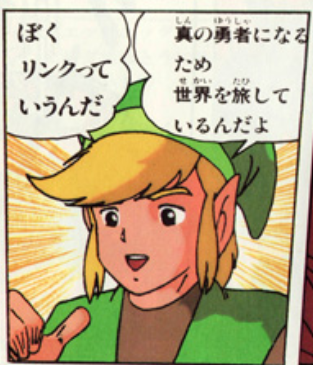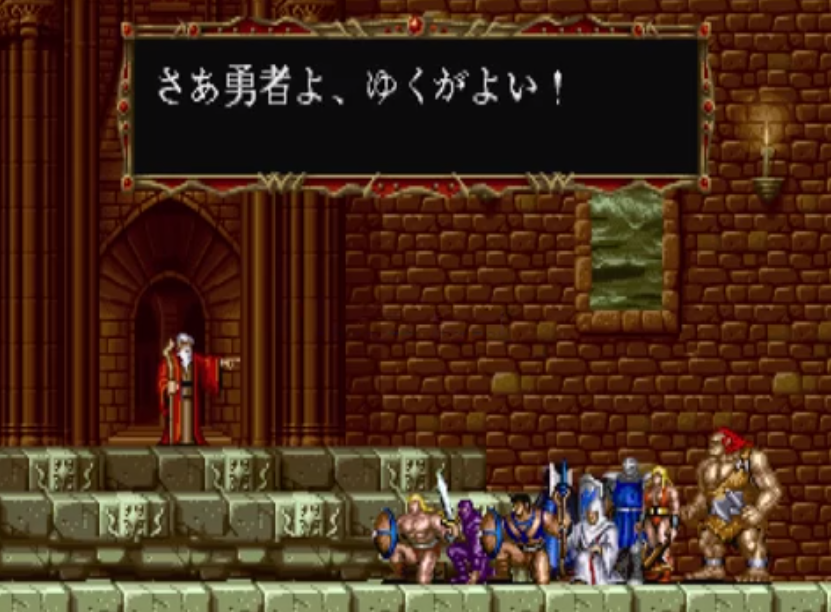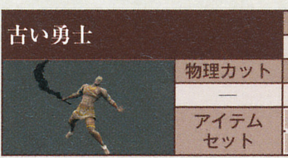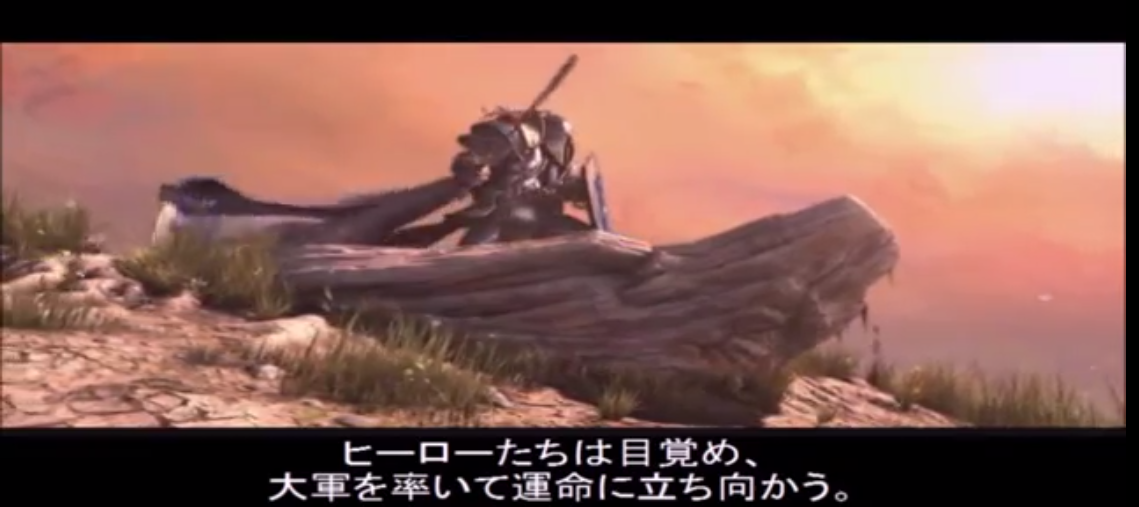Begin any JRPG, at least in terms of the early ones that was set during the Tolkien-esque fantasy golden age of the 80s and you will inevitably encounter terms such as eiyuu and yuusha. These two terms differ wildly for the most part in describing the hero of the story of an in-game legend that the designated player must fulfil in order to gain the mythic accolade of heroism. We shall in this short article look at how these terms differ from the English term "hero."
EIYUU (英雄):
This term literally consists of the components:
英 (EI, hanabusa) - Heroic, flourishing, blossom, English, England.
雄 (YUU, o-, osu, on) - Male, hero, leader, masculine, strength.
Rather virile semantics one might say, depicting the generic Hercules flexing his marmoreal muscles in various poses. The term however has a much more ancient pedigree rooted in Chinese mythology and history. The meanings of "English, England" for the former appertain to the usage of it as a phonetic component in a Chinese rendition of the name for the country itself, which since then Japan adopted into their own language - writing it as イギリス (Igirisu, "England/Great Britain" - itself a reading derived from the kanji 英吉利) or 英国 (eikoku, "England").
According to Kotobank the meaning is:
才知・武勇にすぐれ、常人にできないことを成し遂げた人。
"A person who excels in wit, intelligence, military prowess and valour, that a normal individual would not normally be able to do."
Thus someone of exceptional courage and wits, the very same as the semantics of the English word "hero."
YUUSHA (勇者):
Straight forward enough it literally means "a person (者) who is valorous (勇)" and this also fits with Kotobank's definition. In contrast to the eiyuu, a yuusha is singularly characterised by their valour, rather than having extraordinary intelligence. It is nevertheless also used as a synonym for eiyuu, and as a translation for our "hero."
WITHIN THE TRADITION OF JAPANESE ROLE-PLAYING GAMES:
The term yuusha reigns supreme as became readily apparent, whilst researching for this topic. Eiyuu seemingly being the more formal choice.

ぼく リンクっていうんだ
真の勇者になるため 世界を旅しているんだよ
Boku Rinku te iunda
Shin no yuusha ni naru tame sekai o tabi shite irundayo
"I am called Link. I am travelling the world, so that I may become a true hero (yuusha)!"
(Zeruda no Densetsu: Bakkusutôrî Komikku [Nintendo, Famicom version])
In a special "Backstory Comic" for the very first Legend of Zelda game for Nintendo's Family Computer (Famicom) console, Link titles himself as a yuusha, and for this sake he travels the world.

暗黒の力が、天空を覆いつつある 竜の塔、幻魔宮の奥に光る、
呪われた水晶球ブラックオーブを その手で打ち壊し、
再びこの地上に光を取り戻すのだ
さあ勇者よ、ゆくがよい!
Ankoku no chikara ga tenkuu o ooi tsutsu aru ryuu no tou, genmakyuu no oku ni hikaru.
Norowareta suishoukyuu Burakkuôbu o sono te de uchikowashi,
Futatabi no chijou ni hikaru o torimodosu no da
Saa yuusha yo, yuku ga yoi!
"A dark power that is shrouding the very heavens, the Dragon Tower, within the Phantasmal Demon Palace there shineth a light, thou must destroy the cursed crystal, the Black Orb, then may the light yet again return upon the surface of this Earth.
Now, go forth, hero (yuusha)!"
(Magical Sword [Capcom, arcade version])
The fantasy side-scrolling beat-em up classic, Magic Sword sees the player take the role of either a musclebound male or female warrior who must then ascend the floors of the Dragon Tower to vanquish the evil forces that lurk within and ultimately the Black Orb itself. Before setting off, as part of the attract mode of the arcade machine, the cast is informed by what appears to be an elderly wizard about the dangers that the adventure contains and then greets them off by referring to them as yuusha.

(Picture from the official strategy guide, Demon's Souls Perfect File.)
Even the rarer synonym yuushi (勇士, "brave warrior"), is used more than eiyuu, it would appear such as in Demon Souls for the Japanese name of the boss "The Old Hero", 古い勇士 (furui yuushi, "Ancient Valorous Warrior").
Eiyuu can however be found in the title of certain JRPGs, such as:
SDガンダム ガチャポン戦士3 英雄戦記
SD Gandamu Gachapon Senshi 3 Eiyuu Senki
(SD Gundam Gachapon Warriors 3 - Heroic Records of War) - Famicom
超魔神英雄伝ワタル ANOTHER STEP
Choumajin Eiyuuden Wataru Another Step
(Super Demon God - Heroic Legend - Wataru - ANOTHER STEP) - Playstation 1
義経英雄伝
Yoshitsune Eiyuuden
(The Heroic Legend of Yoshitsune) - Playstation 2
The last one is not purely an RPG, but contains elements appertaining to it, and moreover it proves the literary and formal nuance of the term eiyuu - that moreover denotes a person of exceptional prowess and wits, rather than just merely courage or valour in the case of the yuusha and yuushi.
CONTEXTUAL USAGE IN TRANSLATION:
In the Japanese version of the first Dungeon Keeper game, where the player assumes the role of a devilish being surveying and controlling the construction of vast dungeons - where brave heroes then will attempt to break into and subsequently attack your hordes of the damned, we meet as mentioned the heroes. They are rendered in translation as yuusha:

今のうちに最初の勝利を十分味わっておけ、お前はこの王国のロードの怒りを呼び起こしてしまった。勇者どもがじきにやってくるであろう。
Ima no uchi ni saisho no shouri o juubun ajiwatte oke, omae wa kono oukoku no rôdo no ikari o yobiokoshite shimatta. Yuusha domo ga jiki ni yatte kuru de arou.
"Once you have savoured enough of the sweetness of a first victory, you shall have awoken the ire of the lord of this kingdom. Soon enough the damnable heroes shall be coming."
(Dungeon Keeper [Bullfrog, PC-version])
"Yuusha-domo" (rabble of heroes, damnable heroes) rendered as such due to the derogatory pluralisation suffix domo, which in typical fantasy fashion shows disdain for the virtuous heroes. Here the knights, warriors and wizards that barge into your hellish lair are defined by their valour hence yuusha is the translation for them under the grouping of "heroes."
The strategy RPG, World of Warcraft 3 features not the three regular Japanese words, but the English loan word ヒーロー (hîrô) to describe its brave champions.

ヒーローたちは目覚め、大軍を率いて運命に立ち向かう。
Hîrô-tachi ha mezame, taigun o hikiite unmei ni tachimukau.
"Heroes (hîrô-tachi) are awakening, facing their destiny as they lead grand armies"
(World of Warcraft 3: Reign of Chaos [Blizzard])
Said term has usually more connotations of American superheroes than those heroes of fantasy and mythology, but it may as well also be to fit in with the game terminology of "hero" being the name of the special units in the game that possess greater capabilities than regular soldiers.
Thus it seems to have rounded itself off.